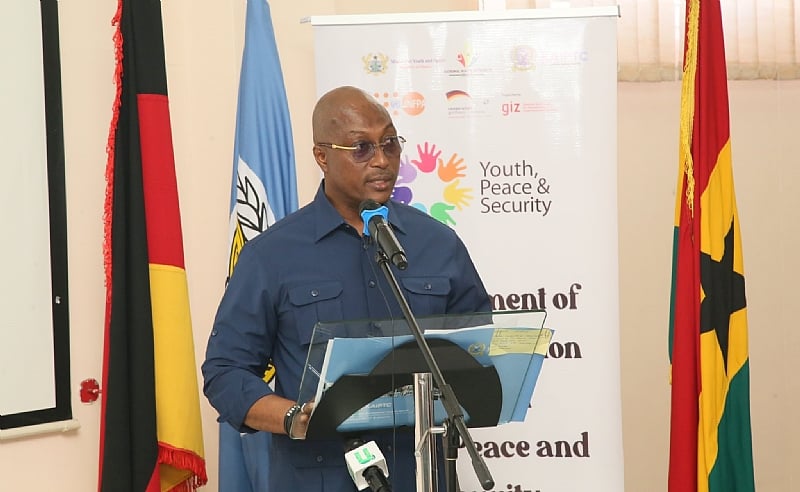The Deputy Commandant of the Kofi Annan International Peacekeeping Training Centre (KAIPTC), Air Commodore David Akrong, recently stressed the critical need for Ghana to develop its National Action Plan (NAP) on Youth, Peace, and Security (YPS) to empower the nation’s youth. During a Dissemination Workshop organized in collaboration with the National Youth Authority (NYA), Akrong highlighted young people’s essential role in the context of Ghanaian and African peace and security. He remarked that the Youth, Peace, and Security agenda not only contributes to stability and development in Ghana but also reflects broader dynamics across the continent. By asserting that young people are not just beneficiaries of peace but rather agents of change and active participants in peacebuilding, he reiterated the importance of creating a framework through the NAP that encourages their involvement in decision-making processes at all levels.
Air Commodore Akrong emphasized that the NAP will serve as a crucial mechanism to harness the potential of Ghana’s youth. The framework is designed to foster inclusivity, empower youth, and promote their active participation in decisions that impact their lives. He urged stakeholders to prioritize collaboration and commitment to make sure that the NAP transcends being just a document; it should act as a roadmap for action, sustainable peace, and youth empowerment. This workshop at KAIPTC followed a recent Technical Working Group retreat aimed at informing stakeholders about the NAP’s development process and aligning it with Ghana’s commitment to United Nations Security Council Resolution 2250, which underscores the pivotal role of youth in conflict resolution and peacebuilding.
Nelson Owusu-Ansah, the Deputy Chief Executive Officer of the National Youth Authority, was optimistic about the transformative potential of the NAP. He pointed out that addressing pressing issues like unemployment, social exclusion, and limited access to education is vital since these challenges often underpin instability and insecurity. Owusu-Ansah reaffirmed the NYA’s dedication to engaging with stakeholders throughout the development of the NAP. By taking a collaborative approach, he expressed hope that the plan would facilitate pathways for youth engagement that contribute to social stability.
The collaborative workshop also featured speeches from other stakeholders, including Adjoa Nyanteng Yenyi, Programme Specialist for Adolescent and Youth Development at the United Nations Population Fund (UNFPA). Yenyi highlighted the importance of a participatory and inclusive approach to developing the NAP, emphasizing that the process must incorporate diverse youth voices from all regions of Ghana. She stressed the necessity of a comprehensive consultation process that accurately represents the varied realities of the nation’s youth, ensuring that the upcoming NAP ultimately empowers young people to lead in peacebuilding efforts.
In addition to these insights, Teresa Kraft, Head of Component for GIZ’s ECOWAS Peace and Security Architecture and Operations (EPSAO) project, acknowledged Ghana’s significant progress in involving youth in decision-making. She pointed out that achieving the ambitious goals of the Youth, Peace, and Security agenda requires societies to reassess their structures, management practices, and mindsets to integrate youth into leadership roles effectively. Kraft’s comments highlighted the need for systemic changes to fully realize the potential of youth contributions to peace and security.
The development of the NAP has garnered notable support from the German government, through initiatives like the ECOWAS Peace and Security Architecture and Operations project, as well as from the UNFPA, showcasing strong international backing for youth-led peace initiatives. This multifaceted support underscores the collaborative efforts required to empower Ghana’s youth as vital actors in the peacebuilding framework. As highlighted in the discussions, a successful NAP is not only a strategic necessity for Ghana’s stability but also a valuable investment in the resilience and future of its youth.














